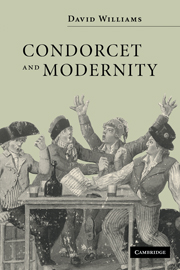Book contents
- Frontmatter
- Contents
- Acknowledgements
- References and abbreviations
- Introduction
- 1 Profile of a political life
- 2 Human nature and human rights
- 3 The civil order
- 4 Managing enlightenment
- 5 Reform and the moral order
- 6 New constructions of equality
- 7 Justice and the law
- 8 Representative government
- 9 The economic order
- 10 Managing the Revolution
- Conclusion: the human odyssey
- Bibliography
- Name index
- Subject index
Conclusion: the human odyssey
Published online by Cambridge University Press: 22 September 2009
- Frontmatter
- Contents
- Acknowledgements
- References and abbreviations
- Introduction
- 1 Profile of a political life
- 2 Human nature and human rights
- 3 The civil order
- 4 Managing enlightenment
- 5 Reform and the moral order
- 6 New constructions of equality
- 7 Justice and the law
- 8 Representative government
- 9 The economic order
- 10 Managing the Revolution
- Conclusion: the human odyssey
- Bibliography
- Name index
- Subject index
Summary
In Condorcet's growing disenchantment with the gilded, sclerotic order of the ancien régime, and in the arrangements that he advocated in an astonishingly wide range of contexts for France's translation to modernity, we can detect a rich, intricately woven synthesis of the great Enlightenment narratives of reason, tolerance, humanity and hope. His deeply pragmatic vision of a regenerated civil order, in which the long-neglected conditions of the pact of association would be reinstated in formal constitutional terms in accordance with the needs, rights and aspirations of a rapidly mutating society marks him out from the generality of eighteenth-century French political thinkers. The last of the second generation of philosophes, Condorcet belonged to a new breed of social planners and political scientists, of policy-makers conscious of the potential power of political arithmetic as an instrument of efficient and enlightened governmental administration and rational forward planning, and for whom the sole purpose of the pact of association was the advancement of public happiness. To this end, he made a unique historical contribution to our understanding of what constitutes the public realm, collective liberty and what ordinary citizens can legitimately hold in common in terms of political public space.
Condorcet was certainly an egalitarian, but it would be misleading to regard him as a precursor of socialism.
- Type
- Chapter
- Information
- Condorcet and Modernity , pp. 277 - 287Publisher: Cambridge University PressPrint publication year: 2004

